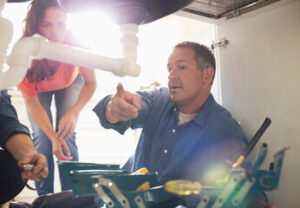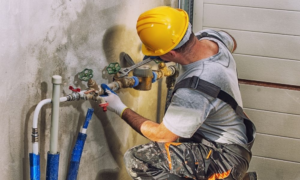Plumbers Cranford NJ install and repair pipes that supply water and carry waste away from homes and businesses. They also work with fixtures like bathtubs, sinks and toilets.

Plumbing professionals must have good customer service skills to listen to their clients’ concerns and explain complex issues in simple terms. They must also be able to provide accurate estimates for their services.
Plumbers install the pipes that supply water and remove waste from homes and businesses. They may also set up fixtures, such as sinks and toilets, as well as appliances like dishwashers and washing machines. To do this job, they must have a wide range of skills and tools, including hand and power tools, pipe cutters, wrenches, and more advanced equipment like drain snakes. Plumbers also have to be familiar with local plumbing codes and regulations, blueprint reading, and construction site safety.
Plumbers typically receive their training through an apprenticeship, which combines classroom instruction with paid on-the-job training. In addition to learning trade skills, apprentices must pass a series of exams to become licensed plumbers. Some plumbers choose to continue their education and earn a college degree in plumbing, which can lead to higher pay scales and more career options.
One of the most important skills for plumbers is the ability to read and interpret blueprints. This is necessary when installing or repairing pipes, as plumbers must be able to see the layout of the pipe and its connections before starting work. They also need to understand the materials they are using, as well as how each piece of pipe connects to other pieces.
Another essential skill for plumbers is the ability to communicate effectively. This is especially true when working with customers, as they must be able to explain complex plumbing issues clearly so that their customers can understand them. They also need to be able to answer questions about pricing, payment terms, and other aspects of their business.
Finally, plumbers must be able to solve problems quickly and accurately. This is because they often work with tight deadlines, and customers expect them to fix their plumbing problems as soon as possible. To do this, they must have strong analytical skills and be able to think outside the box to come up with creative solutions.
A final skill that plumbers need is physical strength, as they sometimes need to lift heavy equipment and tools. They also need to be able to stand for long periods of time while working on a project.
Repair
Plumbers repair and maintain the pipes that deliver water and gas to homes and businesses. They install plumbing fixtures and appliances such as sinks, bathtubs, toilets, and dishwashers. Plumbers also inspect plumbing systems to ensure they are safe and functional. They use tools such as video cameras to check the condition of pipes and pressure gauges to test for leaks. When a fixture or pipe is leaking, broken, or damaged, plumbers must be able to diagnose the problem and find a solution quickly.
Plumbers often work with other construction professionals to ensure that plumbing systems are integrated seamlessly into building projects. This requires them to have good communication skills and be able to explain complex issues in an understandable way. Plumbers may also need to collaborate with clients to determine their needs and provide cost estimates for services.
Some plumbers specialize in specific types of plumbing systems. For example, a medical plumber might be called in to fix complicated water heating systems in hospitals and other health care facilities. A commercial plumber might be hired to install plumbing for large industrial plants. These plumbers must have extensive knowledge of how to maintain and repair industrial piping systems.
Plumbing is a physically demanding job that involves lifting heavy objects and spending long periods of time on your feet. It is important for plumbers to have strong physical stamina and good manual dexterity to manipulate small parts and tools. Plumbers also need to be comfortable working in tight spaces and confined areas. Plumbers often need to wear protective clothing and masks when handling hazardous materials.
In some cases, plumbers need to cut through walls and other structures to access pipes in hard-to-reach places. This can pose a health risk for the plumber, as it increases the likelihood of exposure to infectious diseases like hepatitis and cholera. When a plumber cuts through drywall, they must be careful to avoid puncturing or cutting into any electrical wiring. They should also take extra precautions when working on sewage systems, as they may be exposed to human waste that contains dangerous microbes.
Maintenance
Plumbing is used to transport and dispense clean water, as well as remove waste. It is important to ensure that this process is done correctly in order to prevent health issues and property damage. A plumber can inspect a building’s pipes and fixtures for any issues, such as leaks, cracks, or corrosion. They can also perform routine maintenance tasks such as cleaning drains and removing sediment buildup. This helps maintain water flow and prevents clogs and low water pressure.
Plumbing maintenance can help reduce water wastage and save on utility bills. Leaky faucets, toilets, and appliances can waste gallons of water daily. Fixing these problems promptly can prevent water damage, mold growth, and high utility costs. Regular inspections and maintenance can also catch minor issues before they become expensive emergencies.
In addition to preventing costly repairs, plumbing maintenance can improve a home’s energy efficiency. Inefficient water heaters and appliances can increase energy bills by up to 30%. A plumber can recommend newer, more efficient models that can save money and reduce environmental impact.
Proper plumbing maintenance can also help prevent clogged drains and sewer backups. Regularly inspecting and maintaining your home’s drains can keep them free of hair, food, and other debris that can cause clogs. Plumbers can also install drain screens and strainers to reduce the risk of blockages.
The plumbing system in a house is complex and includes many parts. It is vital to have it regularly inspected and maintained by professionals. A plumber can detect and repair any issues before they become major problems that could require an emergency call out. In addition, a properly functioning plumbing system can help maintain a safe environment and increase a home’s value. A poorly maintained plumbing system can lead to expensive and stressful emergency repairs. It is important to set up a maintenance schedule with a professional plumber and follow their advice on how to maintain your plumbing system at home.
Troubleshooting
Your home’s plumbing system is constantly at work, delivering fresh water to every room and disposing of waste through the sewer line. But problems like leaks, clogs, and broken pipes can affect your daily routine and cause costly damage if not addressed quickly. Fortunately, plumbers are there to help. These professionals have the knowledge and tools to diagnose and repair any problem, from a minor drip to a backed-up drain.
There are a few key qualities to look for in a plumber. First, they need to be able to communicate with customers clearly. This includes listening to their concerns and explaining the options available for fixing the issue. It also means providing accurate estimates and following up on any promised repairs. Finally, it’s important for plumbers to be able to work well under pressure. They often have to deal with emergency situations, such as a burst pipe or sewage backup, and they need to be able to think on their feet and come up with effective solutions fast.
Plumbers also need to be physically fit. This is because they often have to lift heavy objects and work in tight spaces. In addition, they need to be able to stand for long periods of time and have good manual dexterity to manipulate small parts and tools. They should also be comfortable working in a variety of weather conditions.
Another thing to keep in mind is that plumbers should be knowledgeable about a wide range of materials and systems. This includes knowing how to install and repair appliances such as sinks, toilets, water heaters, and garbage disposals. It’s also helpful for them to have knowledge of building codes and regulations. Finally, they should be able to read and interpret blueprints.
There are many different types of plumbers, each with a slightly different set of skills and responsibilities. For example, a commercial plumber works on larger-scale plumbing systems in places such as schools, hospitals, and office buildings. A residential plumber is more likely to work on fixtures and pipes in homes and apartments. And a service plumber deals with emergency situations such as clogged drains and broken water heaters.

